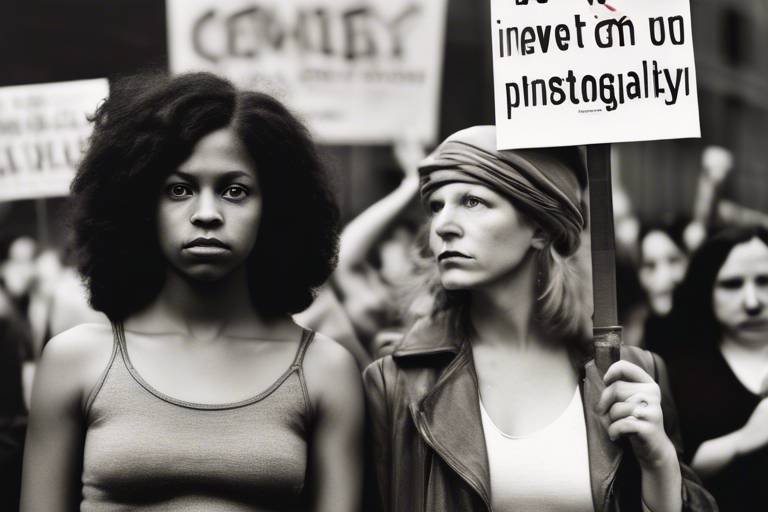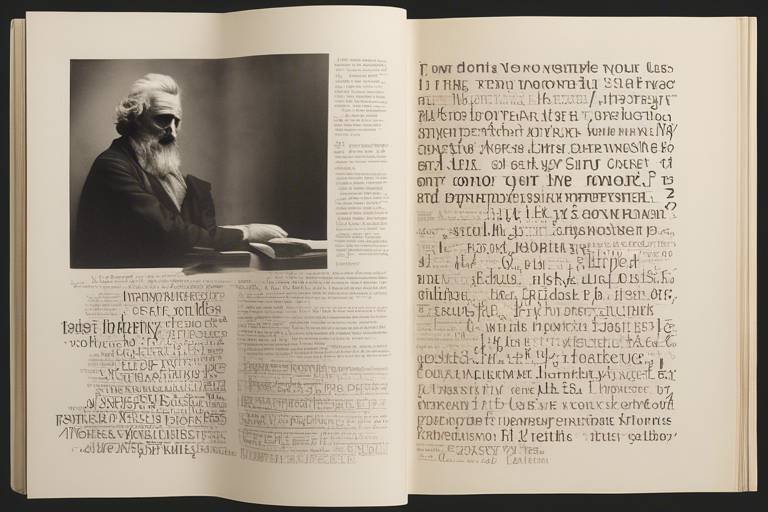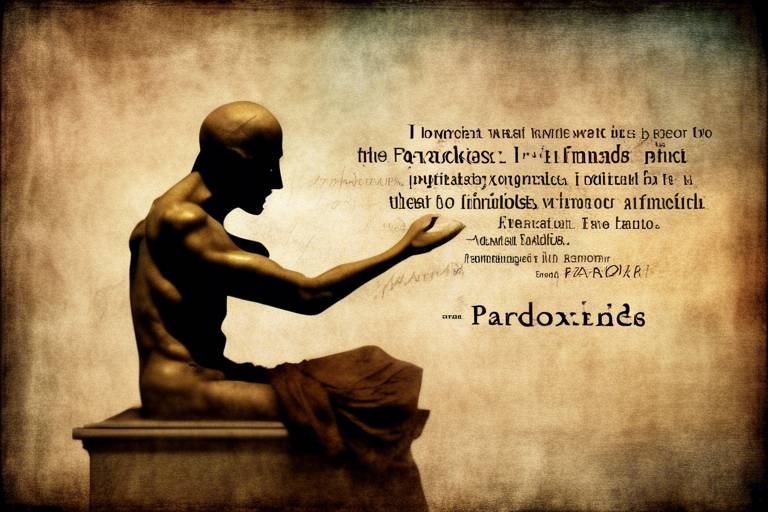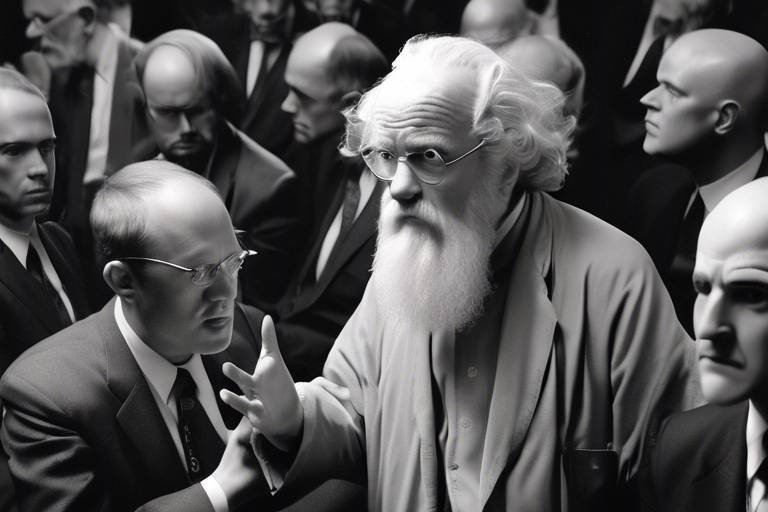Feminism and Philosophy - The Intersectionality
Feminism and philosophy are two domains that, when intertwined, create a powerful discourse on gender, identity, and societal structures. At first glance, they may seem like separate realms, but their intersectionality reveals profound insights into the human experience. This exploration is not just an academic exercise; it is a vital conversation that resonates deeply in today’s world. Feminism challenges the traditional narratives that have long dominated philosophical thought, while philosophy provides a robust framework for analyzing and understanding the complexities of gender dynamics. Together, they foster a critical examination of power relations, pushing for a more equitable society.
But what does it mean to discuss the intersectionality of feminism and philosophy? Imagine a tapestry woven from various threads—each thread represents different identities and experiences, including race, class, gender, and sexuality. At the intersections of these threads lie unique experiences of oppression and privilege. Feminism, particularly in its contemporary form, emphasizes that to understand women’s experiences fully, we must consider how these various identities interact. This intersectional approach not only enriches feminist discourse but also challenges philosophical traditions that have often overlooked these complexities.
As we navigate through this intricate relationship, it becomes clear that the dialogue between feminism and philosophy is not just about theoretical musings. It has real-world implications that can influence social movements, policy-making, and personal identities. The feminist movement has evolved significantly over the decades, and its philosophical underpinnings have played a crucial role in shaping its trajectory. By critically engaging with philosophical ideas, feminists can advocate for change in a way that is informed, nuanced, and impactful.
Moreover, the intersectionality of feminism and philosophy invites us to ask critical questions: How do societal norms shape our understanding of gender? What role does power play in the construction of identity? These inquiries are essential for anyone looking to engage thoughtfully with contemporary issues. By examining the philosophical foundations of feminist thought, we can better understand the complexities of identity and the systems of power that affect our lives.
In conclusion, the intersectionality of feminism and philosophy is a rich field of study that offers valuable insights into the human condition. It challenges us to think critically about our own identities and the societal structures that shape them. As we continue to explore these intersections, we must remain open to new ideas and perspectives, ensuring that our understanding of gender and identity evolves alongside the world around us.
- What is intersectionality in feminism? Intersectionality refers to the way different social identities, such as race, gender, and class, intersect to create unique experiences of oppression or privilege.
- How has feminist philosophy evolved over time? Feminist philosophy has evolved from focusing primarily on women's rights to encompassing a broader analysis of how various identities and power structures interact.
- Why is it important to study the intersection of feminism and philosophy? Studying this intersection helps us understand the complexities of identity and power, leading to a more inclusive and equitable society.
- Who are some key figures in feminist philosophy? Important figures include Simone de Beauvoir, Judith Butler, and bell hooks, each contributing significantly to feminist thought.

Historical Context of Feminism
Understanding the roots of feminism is crucial to grasp its evolution. Feminism, as a movement advocating for women's rights and equality, has a rich and complex history that dates back centuries. It is not merely a modern phenomenon but rather a response to long-standing societal norms that have marginalized women. The historical context of feminism can be traced through various waves, each characterized by distinct goals and ideologies.
The first wave of feminism emerged in the late 19th and early 20th centuries, primarily focusing on legal issues and inequalities, particularly women's suffrage. This wave sought to secure basic rights for women, such as the right to vote, own property, and access education. Pioneers like Mary Wollstonecraft and Elizabeth Cady Stanton laid the groundwork for feminist thought, emphasizing the need for women to be seen as rational beings deserving of equal rights.
As we moved into the mid-20th century, the second wave of feminism arose, expanding its focus beyond legal rights to include issues of sexuality, family, and workplace rights. This wave was heavily influenced by the civil rights movement and sought to address systemic inequalities faced by women in various aspects of life. Figures like Betty Friedan and Gloria Steinem became prominent voices during this period, advocating for reproductive rights and challenging traditional gender roles.
The third wave of feminism, which began in the 1990s, introduced a more inclusive approach, recognizing the diverse experiences of women across different races, classes, and sexual orientations. This wave emphasized the importance of intersectionality, a concept that examines how overlapping identities—such as race, class, and gender—shape individual experiences of oppression and privilege. Feminists like bell hooks and Rebecca Walker were instrumental in bringing attention to these intersections, advocating for a feminism that was not only for white, middle-class women but for all women.
Today, feminism continues to evolve, responding to contemporary issues such as globalization, digital activism, and the ongoing fight against sexual harassment and violence. The historical context of feminism reminds us that while significant progress has been made, the struggle for gender equality is far from over. It is a dynamic and ongoing conversation that requires the voices of women from all walks of life.
In summary, the historical context of feminism is not just a timeline of events but a tapestry woven from the experiences, struggles, and victories of countless women throughout history. Each wave has built upon the last, creating a rich legacy that informs contemporary feminist thought and activism.
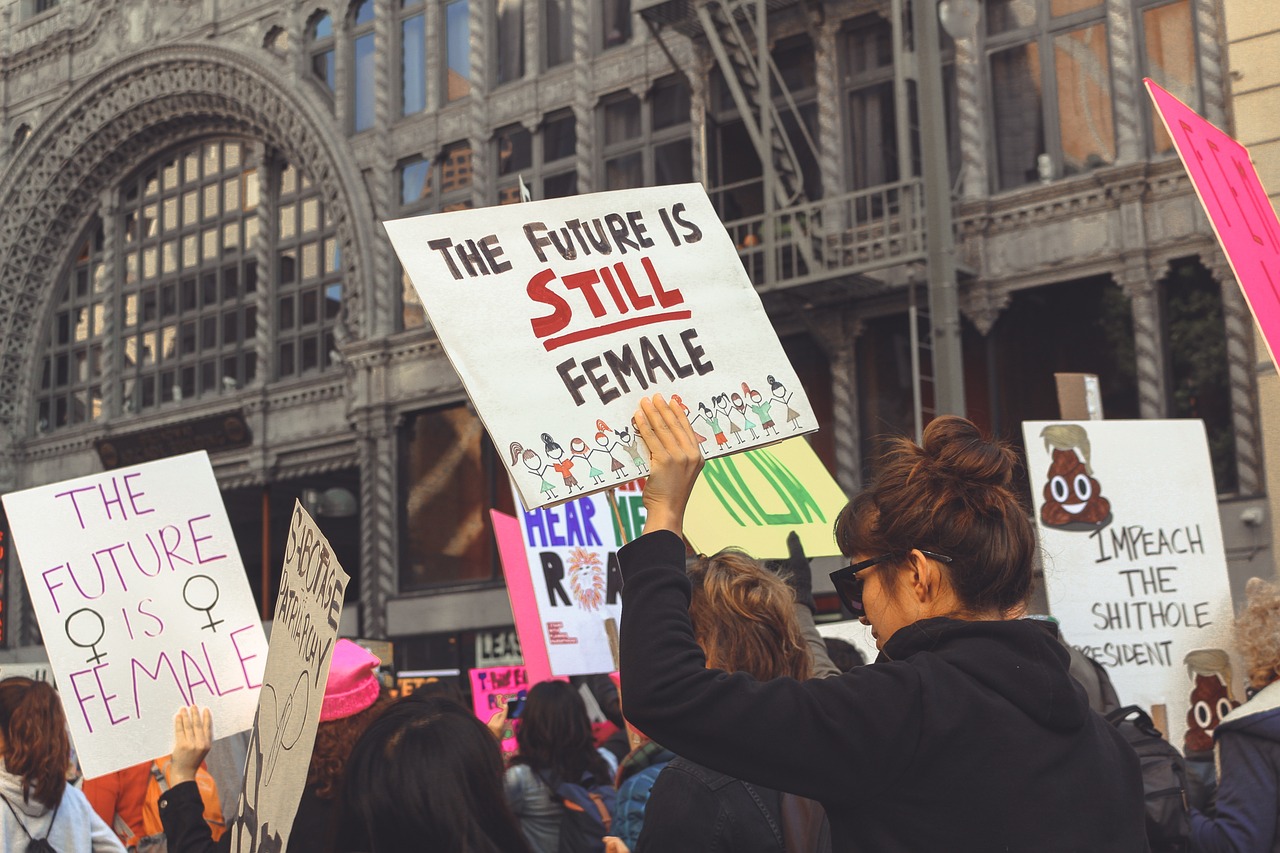
Key Philosophers in Feminism
When we dive into the world of feminist philosophy, we quickly realize that it's not just a single narrative but a rich tapestry woven from the thoughts and ideas of many influential thinkers. These philosophers have challenged traditional perspectives and have laid the groundwork for modern feminist thought. Their contributions are not only significant in the realm of philosophy but have also sparked social movements and changed the way we perceive gender and equality. So, who are these key figures, and what do they bring to the table?
One of the most pivotal figures in feminist philosophy is Simone de Beauvoir. Her groundbreaking book, The Second Sex, published in 1949, is often cited as a foundational text in feminist theory. In it, she explores the construction of womanhood and the ways in which women have been historically positioned as "the Other." De Beauvoir's assertion that "one is not born, but rather becomes, a woman" challenges the essentialist views that limit women's identities to biological determinism. This idea resonates deeply within feminist discourse, as it opens the door to discussions about the social and cultural factors that shape gender identity.
Another luminary in feminist philosophy is Judith Butler, whose theories on gender performativity have revolutionized our understanding of gender as a fluid construct rather than a fixed binary. Butler argues that gender is not something one is, but rather something one does—an ongoing performance shaped by societal norms and expectations. This perspective has profound implications for how we think about gender identity, allowing for a more inclusive understanding that goes beyond traditional categories. Butler's work invites us to question the very foundations of gender and to consider the diverse experiences that exist within it.
Moreover, we cannot overlook the contributions of bell hooks, who has been instrumental in integrating race, class, and gender into feminist discourse. Her work emphasizes the importance of an intersectional approach, arguing that feminism must address the complexities of identity and the ways in which various forms of oppression are interconnected. hooks’ writings encourage us to think critically about the societal structures that perpetuate inequality and to advocate for a more inclusive feminist movement.
These philosophers, along with many others, have collectively shaped the landscape of feminist thought. They challenge us to rethink our assumptions about gender, identity, and power structures. Their ideas have not only influenced academic discourse but have also empowered countless individuals to engage in activism and advocate for social justice. As we explore the intersection of feminism and philosophy, it becomes clear that these thinkers are not just voices of the past; they are vital to the ongoing conversation about equality and human rights.
To summarize, the key philosophers in feminism have made significant contributions that continue to resonate today. Their ideas challenge us to rethink traditional notions of gender and identity, paving the way for a more inclusive and equitable society. Whether through de Beauvoir's existentialism, Butler's performativity, or hooks' intersectionality, these thinkers inspire us to question, engage, and take action.
- Who is considered the first feminist philosopher? While it's difficult to pinpoint a single individual, many credit Mary Wollstonecraft with laying the groundwork for feminist philosophy in the 18th century with her work, A Vindication of the Rights of Woman.
- What is the significance of intersectionality in feminism? Intersectionality is crucial as it acknowledges that individuals experience oppression in varying degrees based on their overlapping identities, such as race, class, and gender.
- How do feminist philosophers influence social movements today? Their ideas provide a theoretical framework that informs activism, helping to shape policies and practices aimed at achieving gender equality and social justice.
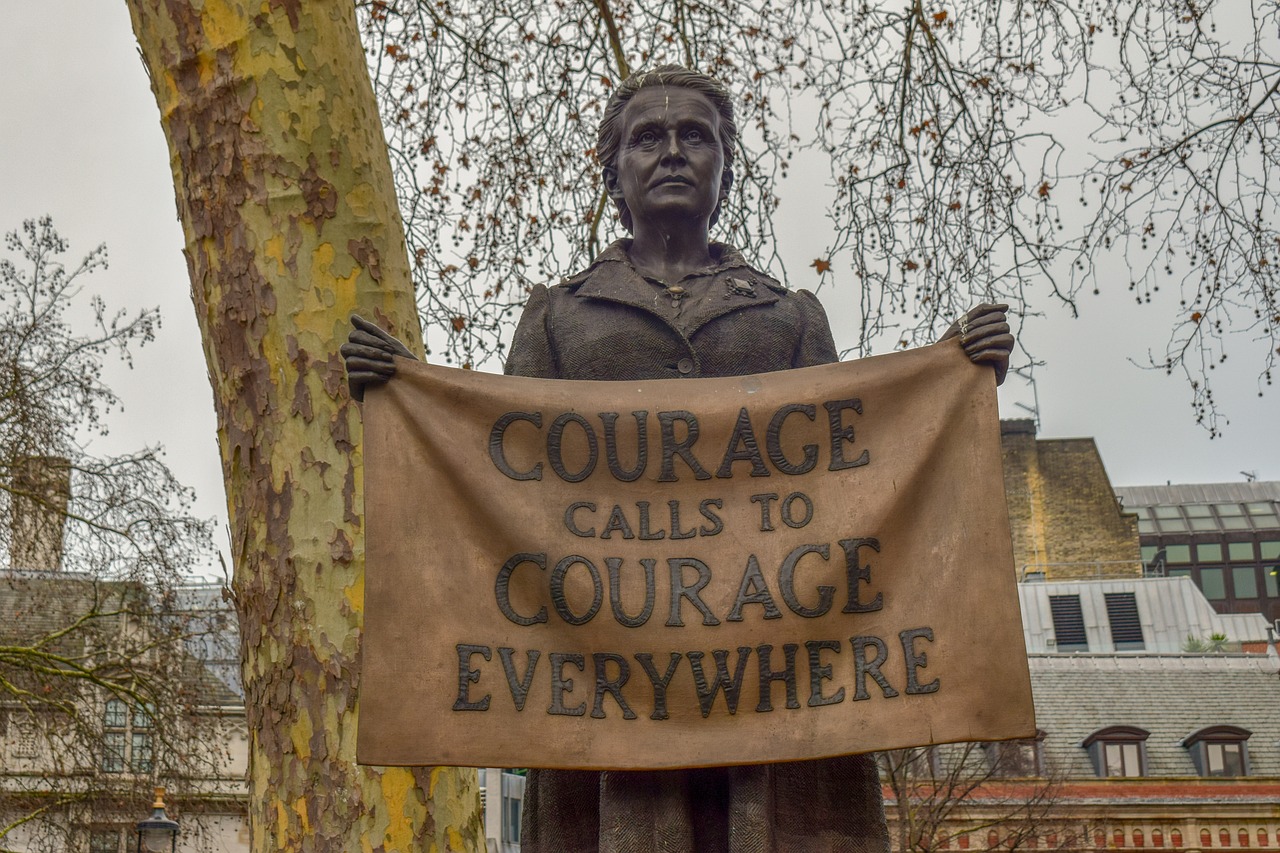
Simone de Beauvoir's Contributions
Simone de Beauvoir, a towering figure in feminist philosophy, made waves with her groundbreaking work, The Second Sex, published in 1949. In this pivotal text, she meticulously examined the societal constructs surrounding womanhood, arguing that women have historically been relegated to the status of "the Other." This concept of "the Other" highlights how women have been defined in relation to men, rather than as autonomous beings. De Beauvoir's assertion that "one is not born, but rather becomes, a woman" encapsulates her existentialist perspective, emphasizing that gender identity is not a fixed trait but a social construct shaped by cultural and historical contexts.
Through her exploration of existentialism, de Beauvoir challenged the traditional narratives that confined women to domestic roles. She posited that true freedom involves transcending societal norms and expectations, urging women to embrace their individuality and pursue their own paths. Her ideas sparked a revolution in feminist thought, encouraging women to question the limitations imposed on them and to seek liberation not just from societal constraints but also from internalized beliefs about their capabilities.
Moreover, de Beauvoir's work laid the groundwork for future feminist thinkers to explore themes of autonomy, identity, and power. She argued that women's liberation is inherently tied to broader social justice movements, advocating for a collective struggle against patriarchal structures. This intersection of feminism with existentialist philosophy not only broadened the scope of feminist discourse but also highlighted the importance of personal agency in the quest for equality.
Critics, however, have pointed out limitations in de Beauvoir's analysis, particularly regarding her focus on the experiences of white, middle-class women. This has led to a rich dialogue among feminist scholars who have expanded upon her ideas, integrating perspectives from various social identities. For instance, intersectional feminists argue that race, class, and sexuality also play crucial roles in shaping women's experiences and should not be overlooked. Thus, while de Beauvoir's contributions were revolutionary, they also opened the door for more inclusive discussions within feminist philosophy.
In summary, Simone de Beauvoir's contributions to feminist philosophy are profound and multifaceted. Her challenge to traditional gender roles and her existentialist approach have not only influenced feminist thought but have also encouraged ongoing dialogues about identity, freedom, and the intersectionality of oppression. As we continue to explore these themes, her legacy remains a vital part of the conversation surrounding gender and equality.
- What is the main idea of The Second Sex? The main idea revolves around the concept that women are defined as "the Other" in relation to men, and it emphasizes the social construction of gender.
- How did de Beauvoir's work influence modern feminism? Her work laid the foundation for understanding gender as a social construct and highlighted the importance of individual freedom in the feminist movement.
- What critiques exist regarding de Beauvoir's contributions? Critics argue that her focus was primarily on white, middle-class women, which has led to calls for a more intersectional approach in feminist philosophy.

The Second Sex,
This article explores the intricate relationship between feminism and philosophy, focusing on how their intersectionality shapes contemporary thought, social movements, and the understanding of gender, identity, and power structures.
Understanding the roots of feminism is crucial to grasp its evolution. This section delves into the key historical milestones that have shaped feminist philosophy and its impact on society.
This part highlights the influential philosophers who have contributed to feminist thought. Their ideas challenge traditional philosophical perspectives and advocate for gender equality and social justice.
Simone de Beauvoir's seminal work, The Second Sex, revolutionized feminist philosophy by examining the construction of womanhood and the implications of existentialism on gender. In this groundbreaking text, de Beauvoir famously stated, "One is not born, but rather becomes, a woman." This assertion encapsulates her belief that gender is not a fixed trait, but rather a social construct shaped by cultural and historical contexts. Her exploration into the ways women have been historically marginalized and defined in relation to men provides an essential framework for understanding gender dynamics.
This section discusses how existentialist themes in de Beauvoir's work emphasize the importance of individual freedom and the rejection of societal norms that restrict women's identities. By applying existentialist philosophy, she argued that women must assert their own identities and create meaning in their lives, rather than conforming to pre-existing roles assigned by society. This notion of freedom is not just a philosophical concept, but a call to action for women to break free from the chains of oppression and redefine their existence on their terms.
An analysis of critiques surrounding de Beauvoir's ideas reveals a rich dialogue within feminist philosophy. While many celebrate her contributions, others argue that her focus on the experiences of white, middle-class women overlooks the diverse realities faced by women from different backgrounds. Critics like bell hooks have pointed out that feminism must be inclusive and attentive to issues of race, class, and sexuality, expanding upon Beauvoir's foundational ideas. This ongoing conversation highlights the evolving nature of feminist thought and the necessity of intersectionality in addressing the complexities of women's experiences.
Judith Butler's theories on gender performativity have significantly influenced feminist philosophy, prompting discussions on the fluidity of gender and the social constructs surrounding it.
Intersectionality is a vital concept in feminist philosophy that examines how various social identities intersect to create unique experiences of oppression and privilege. This section explores its implications.
Examining how race intersects with gender, this part discusses the unique challenges faced by women of color within feminist movements and the necessity of inclusive dialogue.
This section addresses the relationship between class and feminism, highlighting how economic disparities impact women's rights and the feminist agenda in various socio-economic contexts.
- What is the main argument of The Second Sex?
The main argument of The Second Sex is that womanhood is not a biological destiny but a social construct shaped by historical and cultural contexts. De Beauvoir emphasizes the need for women to assert their freedom and identity beyond societal norms.
- How does intersectionality relate to feminism?
Intersectionality in feminism highlights how various social identities—such as race, class, and sexuality—interact to create unique experiences of oppression. It stresses the importance of inclusive dialogue that considers these diverse perspectives.
- Who are some key figures in feminist philosophy?
Some key figures include Simone de Beauvoir, Judith Butler, bell hooks, and many others who have contributed to the discourse on gender, identity, and social justice.

revolutionized feminist philosophy by examining the construction of womanhood and the implications of existentialism on gender.
This article explores the intricate relationship between feminism and philosophy, focusing on how their intersectionality shapes contemporary thought, social movements, and the understanding of gender, identity, and power structures.
Understanding the roots of feminism is crucial to grasp its evolution. This section delves into the key historical milestones that have shaped feminist philosophy and its impact on society.
This part highlights the influential philosophers who have contributed to feminist thought. Their ideas challenge traditional philosophical perspectives and advocate for gender equality and social justice.
Simone de Beauvoir's seminal work, The Second Sex, revolutionized feminist philosophy by examining the construction of womanhood and the implications of existentialism on gender. In her groundbreaking text, de Beauvoir argues that "one is not born, but rather becomes, a woman." This statement underlines the idea that gender is not a natural fact, but a social construct shaped by cultural and historical contexts.
De Beauvoir's analysis highlights how traditional views of femininity have been constructed through patriarchal narratives, which often limit women's identities to roles defined by men. By dissecting these constructs, she opens a dialogue about the true essence of womanhood, urging women to challenge the societal norms that confine them. This revolutionary perspective not only reshapes feminist philosophy but also invites women to embrace their freedom and agency.
The existentialist themes present in de Beauvoir's work emphasize the importance of individual freedom. She draws upon existentialist ideas that prioritize personal choice and responsibility, suggesting that women must reject the societal norms that restrict their identities. By asserting that women can define themselves beyond the roles imposed upon them, de Beauvoir aligns feminist thought with existentialism, advocating for a life lived authentically and on one's own terms.
This intersection of existentialism and feminism is profound. It encourages women to take ownership of their lives and choices, asserting that they are not merely passive subjects but active agents capable of shaping their destinies. In this context, de Beauvoir's philosophy becomes a powerful call to arms for women everywhere, urging them to break free from the shackles of societal expectations.
While de Beauvoir's contributions are undeniably significant, her ideas have faced critiques from various quarters. Some feminist thinkers argue that her focus on existentialism and individualism overlooks the collective experiences of marginalized groups. For instance, women of color and those from lower socio-economic backgrounds may find that de Beauvoir’s emphasis on personal freedom does not fully capture their unique struggles against multiple layers of oppression.
Moreover, critics have pointed out that de Beauvoir's analysis primarily reflects the experiences of white, middle-class women, potentially sidelining the voices of those from diverse backgrounds. This has led to further developments in feminist theory, where later thinkers have expanded upon and challenged her ideas, incorporating intersectionality and a more inclusive understanding of gender and identity.
Judith Butler's theories on gender performativity have significantly influenced feminist philosophy, prompting discussions on the fluidity of gender and the social constructs surrounding it.
Intersectionality is a vital concept in feminist philosophy that examines how various social identities intersect to create unique experiences of oppression and privilege. This section explores its implications.
Examining how race intersects with gender, this part discusses the unique challenges faced by women of color within feminist movements and the necessity of inclusive dialogue.
This section addresses the relationship between class and feminism, highlighting how economic disparities impact women's rights and the feminist agenda in various socio-economic contexts.
- What is feminism? Feminism is a movement aimed at advocating for women's rights and equality across various spheres of life.
- Who was Simone de Beauvoir? Simone de Beauvoir was a French existentialist philosopher and feminist known for her influential work, The Second Sex.
- What is intersectionality? Intersectionality is a framework for understanding how various social identities, such as race, gender, and class, intersect to create unique experiences of oppression and privilege.
- How does Judith Butler contribute to feminist philosophy? Judith Butler's work on gender performativity challenges traditional notions of gender, arguing that it is a social construct rather than a fixed identity.

Existentialism and Gender
Existentialism, a philosophical movement that emphasizes individual freedom and choice, plays a pivotal role in understanding gender through the lens of Simone de Beauvoir's work. In her groundbreaking book, The Second Sex, de Beauvoir argues that women have been historically defined as the "Other," a concept that highlights how societal norms and expectations have constrained women's identities. This existentialist approach invites us to question: what does it truly mean to be a woman in a world that often seeks to define us?
De Beauvoir's existentialism challenges the traditional narratives surrounding gender by asserting that gender is not an inherent quality, but rather a construct shaped by societal influences. She posits that women must reject the roles imposed upon them and instead embrace their freedom to define their own existence. This idea resonates deeply with contemporary discussions about gender fluidity and the rejection of binary classifications. In a sense, de Beauvoir is saying that just as we are free to choose our paths in life, we are also free to choose our identities, unshackled by the constraints of societal expectations.
One of the key themes in existentialism is the idea of authenticity. For women, this means living in a way that is true to oneself rather than conforming to the roles dictated by society. De Beauvoir illustrates this through the metaphor of the "becoming" of a woman, suggesting that womanhood is not a static state but a dynamic process of self-discovery and self-definition. She encourages women to embrace their subjectivity and to actively participate in the creation of their own identities. This perspective not only empowers individuals but also challenges the patriarchal structures that seek to limit women's potential.
However, the application of existentialism to gender is not without its critiques. Some argue that de Beauvoir's focus on individual freedom overlooks the systemic barriers that many women face, particularly those from marginalized backgrounds. While her existentialist framework emphasizes personal choice, it can sometimes downplay the social and economic conditions that restrict women's autonomy. This critique opens up a broader conversation about the intersection of existentialism and feminism, prompting us to consider how we can address both individual agency and structural oppression.
In conclusion, the intersection of existentialism and gender as articulated by Simone de Beauvoir provides a powerful framework for understanding the complexities of womanhood. It encourages women to seek authenticity in their lives and to challenge the societal norms that confine them. As we navigate the contemporary landscape of gender identity, de Beauvoir's insights remain relevant, reminding us that the journey toward self-definition is both a personal and collective endeavor.
- What is existentialism? Existentialism is a philosophical movement that emphasizes individual freedom, choice, and the search for meaning in a seemingly indifferent universe.
- How does existentialism relate to feminism? Existentialism relates to feminism by advocating for individual freedom and the rejection of societal norms that limit women's identities.
- Who is Simone de Beauvoir? Simone de Beauvoir was a French existentialist philosopher, known for her work on feminism and gender theory, particularly in her book The Second Sex.
- What does "the Other" mean in feminist philosophy? "The Other" refers to the way women have been historically defined in relation to men, often seen as secondary or inferior.
- Why is authenticity important in gender discussions? Authenticity is important because it encourages individuals to live true to themselves rather than conforming to societal expectations, fostering empowerment and self-discovery.

Critiques of Beauvoir
Simone de Beauvoir's contributions to feminist philosophy, particularly through her groundbreaking work, The Second Sex, have undeniably paved the way for modern feminist thought. However, her ideas have not gone unchallenged. Critics argue that while Beauvoir brilliantly articulates the concept of “the Other” and the societal constructs surrounding womanhood, she often overlooks the complexities of race, class, and sexuality that intersect with gender. In essence, her analysis predominantly centers on the experiences of white, middle-class women, which raises questions about the inclusivity of her perspective.
One of the primary critiques is that Beauvoir's existentialist framework tends to universalize the female experience. Critics like bell hooks have pointed out that this approach can marginalize the voices of women from diverse backgrounds. For instance, hooks emphasizes that the struggles faced by Black women are distinct and cannot be fully understood through a lens that primarily considers gender in isolation. This critique highlights the need for a more nuanced understanding of how different identities interact within the feminist discourse.
Moreover, some feminist theorists argue that Beauvoir's focus on individual freedom and autonomy may inadvertently reinforce capitalist ideologies. By promoting the idea that women can achieve liberation through personal choice and existential freedom, she may neglect the structural inequalities that hinder such choices for many women, particularly those from lower socio-economic backgrounds. This raises the question: can true freedom exist in a society where economic barriers persist?
Another significant critique comes from the realm of post-structuralism, particularly from thinkers like Judith Butler. Butler challenges Beauvoir's notion of a stable gender identity, arguing that gender is not a fixed essence but rather a performance shaped by cultural and social contexts. This perspective invites a more fluid understanding of gender, suggesting that Beauvoir's existentialist framework may not fully account for the complexities of identity that contemporary feminism seeks to address.
In summary, while Beauvoir's work remains foundational in feminist philosophy, it is essential to recognize its limitations. The critiques surrounding her ideas serve as a catalyst for ongoing discussions about the intersectionality of gender, race, and class within feminist theory. By engaging with these critiques, contemporary feminists can create a more inclusive dialogue that acknowledges the diverse experiences of all women.
- What is Simone de Beauvoir's main argument in The Second Sex?
Beauvoir argues that women have historically been defined as the "Other" in relation to men and that this societal construct limits women's freedom and identity. - How does intersectionality relate to feminist philosophy?
Intersectionality examines how various social identities, such as race, class, and gender, intersect to create unique experiences of oppression and privilege. - What are some critiques of Beauvoir's work?
Critics argue that Beauvoir's analysis often centers on the experiences of white, middle-class women and overlooks the complexities of race, class, and sexuality. - How has Judith Butler influenced feminist thought?
Butler's theories on gender performativity challenge the notion of fixed gender identities, emphasizing the fluidity of gender and the social constructs surrounding it.

Judith Butler and Gender Theory
Judith Butler is a name that resonates deeply within the realms of feminist philosophy and gender studies. Her groundbreaking theories on gender performativity have not only redefined how we understand gender but have also sparked a revolution in feminist thought. At the heart of Butler's philosophy is the idea that gender is not a fixed attribute but rather a fluid performance. This means that gender is something we do, rather than something we are. Imagine gender as a play where everyone is an actor, constantly performing their roles based on societal expectations. This perspective challenges the traditional binary view of gender, opening up a world of possibilities where identities can be diverse and multifaceted.
Butler's seminal work, Gender Trouble, published in 1990, serves as a cornerstone for contemporary gender theory. In this text, she argues that the very categories of 'man' and 'woman' are socially constructed and maintained through repeated behaviors and societal norms. She famously states that "gender is not a noun, but a verb," emphasizing that it is an ongoing process rather than a static state. This notion has profound implications for how we view not only gender but also the roles that individuals play in society. It invites us to question the norms that dictate our behaviors and to recognize the power structures that enforce these identities.
Moreover, Butler's theories extend beyond gender to encompass issues of sexuality, race, and class. By advocating for a more inclusive understanding of identity, she encourages a dialogue that recognizes the complexities of individual experiences. For example, she highlights how the performance of gender can vary dramatically across different cultures and contexts, suggesting that the intersection of various identities creates unique experiences of oppression and privilege.
However, Butler's work has not been without its critiques. Some scholars argue that her emphasis on performativity can overlook the material realities faced by individuals, particularly those from marginalized backgrounds. They contend that while gender may be performative, the consequences of failing to conform to societal norms can be very real and often dangerous. This critique sparks important conversations about the balance between theoretical frameworks and the lived experiences of individuals navigating these complex identities.
In summary, Judith Butler's contributions to gender theory have profoundly influenced feminist philosophy, inviting us to rethink our understanding of gender as a performative act. Her work encourages us to consider how societal norms shape our identities and how we can challenge these constructs to create a more inclusive and equitable society. As we continue to explore the intersections of gender, race, and class, Butler's insights remain crucial in shaping contemporary discussions around identity and power.
- What is gender performativity? Gender performativity is the theory that gender is not an inherent quality but rather something that is enacted through repeated behaviors and societal norms.
- How does Judith Butler's work impact feminism? Butler's work challenges traditional views of gender, promoting a more fluid understanding that incorporates diverse identities and experiences.
- What are some critiques of Butler's theories? Critics argue that her focus on performativity may overlook the material realities and consequences faced by individuals who do not conform to societal gender norms.

The Role of Intersectionality
Intersectionality is not just a buzzword; it’s a critical framework that helps us understand the complex layers of identity and oppression that individuals experience. At its core, intersectionality examines how different social identities—such as race, gender, class, sexuality, and ability—interact and overlap, creating unique experiences of both privilege and discrimination. This concept was coined by legal scholar Kimberlé Crenshaw in the late 1980s, and it has since become a cornerstone of feminist philosophy.
To grasp the significance of intersectionality, consider this analogy: think of a person as a multi-faceted gem. Each facet represents a different aspect of their identity—some might shine brightly while others remain hidden in the shadows. When we focus solely on one facet, we miss the full brilliance of the gem. Similarly, feminist movements must consider the various intersecting identities that shape women's experiences. Ignoring these intersections can lead to a narrow understanding of feminism that fails to address the needs of all women, particularly those from marginalized backgrounds.
For instance, a white woman and a Black woman may both identify as feminists, yet their experiences can be vastly different due to the influence of race on their social standing. This is why intersectionality is essential; it encourages a more inclusive dialogue that recognizes these differences and advocates for a feminism that is truly representative of all women. Without this lens, we risk perpetuating a version of feminism that centers the experiences of a privileged few, often sidelining the voices of women of color, LGBTQ+ individuals, and those from lower socio-economic backgrounds.
Furthermore, intersectionality has profound implications for social movements. It challenges activists to consider how various forms of oppression are interconnected. For example, a campaign for women’s rights that does not address issues of racial inequality or economic justice is likely to fall short. By understanding the intersections of these identities, activists can create more comprehensive strategies that address the root causes of oppression.
Here’s a quick look at how intersectionality plays out in different contexts:
| Identity Factor | Impact on Feminism |
|---|---|
| Race | Women of color face unique challenges that often go unaddressed in mainstream feminist discussions. |
| Class | Economic disparities can limit access to resources, education, and opportunities for women, influencing their ability to advocate for rights. |
| Sexual Orientation | Lesbian and bisexual women may encounter different societal pressures and discrimination than heterosexual women, necessitating tailored approaches. |
| Ability | Women with disabilities face barriers that intersect with gender, requiring a more nuanced understanding of accessibility and rights. |
In conclusion, intersectionality is not merely an academic concept; it is a vital tool for understanding and addressing the diverse experiences of women in society. By embracing this approach, we can cultivate a more inclusive feminist movement that champions the rights of all individuals, regardless of their intersecting identities. This ensures that the fight for equality is not just a battle for some, but a collective struggle for everyone.
- What is intersectionality? Intersectionality is a framework for understanding how various social identities intersect to create unique experiences of oppression and privilege.
- Who coined the term intersectionality? The term was coined by legal scholar Kimberlé Crenshaw in the late 1980s.
- Why is intersectionality important in feminism? It ensures that the feminist movement is inclusive and addresses the diverse experiences of all women, particularly those from marginalized backgrounds.
- How can intersectionality impact social movements? It encourages activists to consider multiple forms of oppression, leading to more comprehensive and effective strategies for advocacy.

Race and Feminism
When we talk about feminism, it's essential to recognize that it's not a monolithic movement; it is as diverse as the women it represents. The intersection of race and feminism highlights the unique challenges faced by women of color, who often find themselves navigating both gender and racial discrimination. This dual struggle creates a complex landscape where the experiences of these women cannot be fully understood through a singular lens of feminism. Instead, we must embrace an intersectional approach that acknowledges how race, gender, and other identities converge to shape individual experiences.
Historically, mainstream feminism has often centered around the experiences of white, middle-class women, leading to a significant oversight of the voices and challenges faced by women of color. This oversight has sparked a necessary dialogue about inclusivity and representation within feminist movements. Women like bell hooks and Audre Lorde have been pivotal in bringing attention to these disparities, arguing that feminism must be inclusive to be effective. They remind us that the fight for gender equality cannot ignore the realities of race and class; otherwise, it risks becoming a movement that serves only a privileged few.
One of the key discussions surrounding race and feminism is the idea of double jeopardy. Women of color often face a unique set of challenges that stem from both their gender and race. For example, they may encounter discrimination in the workplace that is exacerbated by their racial identity, leading to compounded effects on their economic and social status. This reality necessitates a feminist approach that is not only aware of these intersections but actively seeks to address them.
Moreover, the concept of intersectionality, coined by scholar Kimberlé Crenshaw, plays a critical role in understanding the multi-faceted nature of oppression. Intersectionality allows us to see how various forms of discrimination overlap and reinforce one another, creating unique experiences of marginalization. For instance, a Black woman may experience sexism in a way that is distinctly different from that of a white woman due to the added layer of racial prejudice. Recognizing these intersections is vital for developing effective strategies for advocacy and support.
As we move forward in feminist discourse, it is crucial to include a diverse range of voices and perspectives. This means actively listening to and uplifting the experiences of women of color, ensuring that their stories are integrated into the broader feminist narrative. By doing so, we can create a more inclusive movement that truly represents the complexities of gender and race.
In conclusion, the intersection of race and feminism is not just a topic for discussion; it is a call to action. We must challenge the traditional frameworks of feminism that have historically marginalized women of color and work towards a more inclusive and equitable movement. Only then can we hope to achieve true gender equality that recognizes and values the diverse experiences of all women.
- What is intersectionality in feminism? Intersectionality refers to the way different social identities, such as race, gender, and class, intersect to create unique experiences of oppression and privilege.
- How does race impact women's rights? Women of color often face additional layers of discrimination that can complicate their fight for gender equality, making it essential to address both gender and racial issues within feminist movements.
- Who are some influential feminist thinkers of color? Notable figures include Audre Lorde, bell hooks, and Kimberlé Crenshaw, who have all contributed significantly to the discourse on race and feminism.

Class and Economic Inequality
When we talk about feminism, it’s essential to recognize that it doesn’t exist in a vacuum. One of the most pressing issues that intertwine with feminist thought is . You see, gender and class are not just separate issues; they are deeply intertwined, creating a complex web of oppression and privilege that affects women differently based on their socio-economic status. Imagine a tapestry where each thread represents a different aspect of identity—race, gender, class—when one thread is pulled, the entire fabric shifts.
Women from various socio-economic backgrounds experience the feminist agenda in dramatically different ways. For instance, a woman from a wealthy background may face challenges related to gender discrimination in the workplace, but she often has access to resources and support systems that can help her navigate these obstacles. In contrast, a woman from a low-income background may struggle not only with gender discrimination but also with issues like poverty, lack of access to education, and limited job opportunities. This disparity highlights a crucial point: while feminism aims to address gender inequality, it must also consider the economic factors that exacerbate these inequalities.
According to a recent study, women in the lowest income brackets face a multitude of barriers that hinder their progress. For instance, they are more likely to be employed in low-wage jobs without benefits, lack access to affordable childcare, and encounter systemic biases that limit their career advancement. Here is a table summarizing some of these barriers:
| Barrier | Description |
|---|---|
| Low-Wage Employment | Women in low-income jobs often earn significantly less than their male counterparts. |
| Lack of Benefits | Many low-wage jobs do not offer health insurance or retirement benefits. |
| Childcare Costs | High childcare costs can prevent women from pursuing better job opportunities. |
| Systemic Bias | Women of lower socio-economic status often face additional layers of discrimination. |
Moreover, the feminist movement has sometimes been criticized for not adequately addressing the needs of women from lower socio-economic backgrounds. This oversight can lead to a sense of alienation and disconnection among women who feel that their voices are not being heard. The call for an inclusive feminist dialogue is more important than ever. It’s not just about advocating for women; it’s about recognizing the unique challenges faced by different groups of women and creating a platform where all voices can be heard.
In recent years, there has been a growing recognition of the importance of intersectionality in feminist discourse. This concept urges us to consider how various factors such as race, class, and gender intersect to create unique experiences of oppression. For example, a Black woman may face challenges that are different from those faced by a white woman or a Latina woman, all of which are compounded by their economic status. This understanding is crucial for creating a more equitable society where all women can thrive.
In conclusion, the relationship between class and economic inequality within feminist philosophy is not just a theoretical discussion; it has real-world implications that affect the lives of countless women. By embracing an inclusive approach that considers the diverse experiences of women across different socio-economic backgrounds, we can work towards a feminist movement that is truly representative and impactful. So, let’s ask ourselves: how can we ensure that every woman, regardless of her economic status, has a seat at the table?
- What is the relationship between feminism and economic inequality?
- How does intersectionality play a role in feminism?
- Why is it important to include women from all socio-economic backgrounds in feminist discussions?
Feminism seeks to address gender inequality, but it must also consider how economic factors contribute to the challenges women face, especially those from lower socio-economic backgrounds.
Intersectionality emphasizes the interconnectedness of social identities, highlighting that women experience oppression differently based on their race, class, and other factors.
Including diverse voices ensures that the feminist movement addresses the unique challenges faced by all women, making it more effective and representative.
Frequently Asked Questions
- What is feminism?
Feminism is a movement and ideology that seeks to achieve gender equality and advocate for women's rights. It challenges the societal norms and structures that perpetuate discrimination and inequality based on gender.
- How does philosophy relate to feminism?
Philosophy provides a framework for examining the foundational ideas about gender, identity, and power structures. Feminist philosophy critiques traditional philosophical perspectives and introduces new ways of thinking about these concepts, emphasizing the importance of women's experiences and voices.
- Who are some key philosophers in feminism?
Some influential feminist philosophers include Simone de Beauvoir, who explored the construction of womanhood, and Judith Butler, known for her theories on gender performativity. Their works have significantly shaped contemporary feminist thought.
- What is intersectionality?
Intersectionality is a concept that examines how various social identities, such as race, class, and gender, intersect to create unique experiences of oppression and privilege. It emphasizes that individuals can face multiple forms of discrimination simultaneously.
- How does race impact feminism?
Race intersects with gender in ways that create distinct challenges for women of color within feminist movements. It highlights the need for inclusive dialogue that addresses the specific experiences and struggles faced by diverse groups of women.
- What role does economic inequality play in feminism?
Economic disparities significantly affect women's rights and the feminist agenda. Class issues shape the experiences of women, and addressing economic inequality is crucial for achieving true gender equality and social justice.
- What are some critiques of feminist philosophy?
Critiques of feminist philosophy often focus on its perceived limitations, such as a lack of attention to race or class issues. Many later feminist thinkers have expanded upon earlier ideas to create a more inclusive and comprehensive understanding of feminism.

